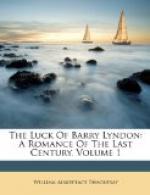Shall I tell you how? The minx had been to see me one day, as I sat up in my bed, convalescent; she was in such high spirits, and so gracious and kind to me, that my heart poured over with joy and gladness, and I had even for my poor mother a kind word and a kiss that morning. I felt myself so well that I ate up a whole chicken, and promised my uncle, who had come to see me, to be ready against partridge-shooting, to accompany him, as my custom was.
The next day but one was a Sunday, and I had a project for that day which I determined to realise, in spite of all the doctor’s and my mother’s injunctions: which were that I was on no account to leave the house, for the fresh air would be the death of me.
Well, I lay wondrous quiet, composing a copy of verses, the first I ever made in my life; and I give them here, spelt as I spelt them in those days when I knew no better. And though they are not so polished and elegant as ‘Ardelia ease a Love-sick Swain,’ and ’When Sol bedecks the Daisied Mead,’ and other lyrical effusions of mine which obtained me so much reputation in after life, I still think them pretty good for a humble lad of fifteen:—
The rose of Flora.
Sent by a Young Gentleman of Quality to Miss Br-dy, of Castle Brady.
On Brady’s tower there grows a flower,
It is the loveliest flower that
blows,—
At Castle Brady there lives a lady
(And how I love her no one knows):
Her name is Nora, and the goddess Flora
Presents her with this blooming rose.
‘O Lady Nora,’ says the goddess Flora,
’I’ve many a rich and bright
parterre;
In Brady’s towers there’s seven
more flowers,
But you’re the fairest lady there:
Not all the county, nor Ireland’s bounty,
Can projuice a treasure that’s half
so fair!
What cheek is redder? sure roses fed her!
Her hair is maregolds, and her eye of
blew
Beneath her eyelid is like the vi’let,
That darkly glistens with gentle jew?
The lily’s nature is not surely whiter
Than Nora’s neck is,—and
her arrums too.
‘Come, gentle Nora,’ says the goddess
Flora,
’My dearest creature, take my advice,
There is a poet, full well you know it,
Who spends his lifetime in heavy sighs,—
Young Redmond Barry, ’tis him you’ll
marry,
If rhyme and raisin you’d choose
likewise.’




